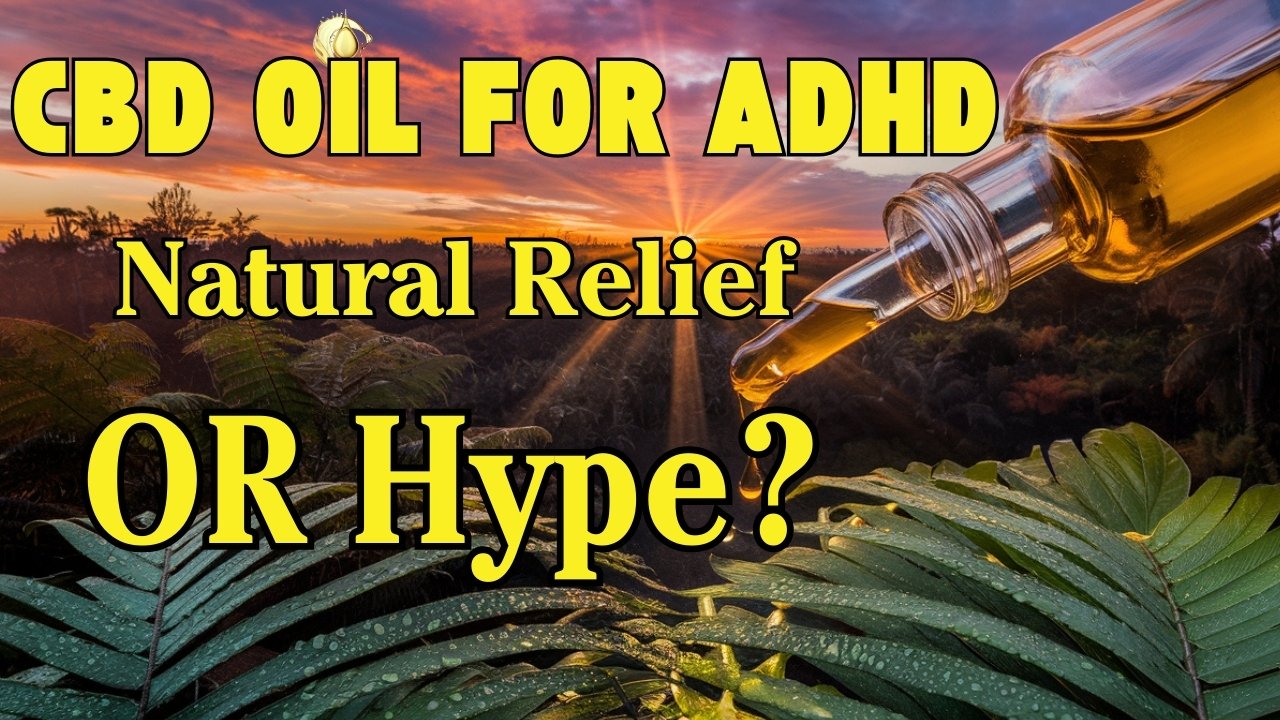
Image Credit: Rosemary Ingado PA
Can CBD oils be used for ADHD?
ADHD, or Attention-Deficit/Hyperactivity Disorder, is often overlooked in adults, with a staggering 75% remaining undiagnosed. While early diagnosis is common in children, adults frequently go years without proper screening, leading to significant challenges in various aspects of life. Traditional treatments often include behavioral therapy and stimulant medications. However, there is growing interest in alternative treatments, including Cannabidiol (CBD), a non-psychoactive compound derived from the cannabis plant. CBD oil has some anecdotal evidence that it can help with ADHD symptoms, but there is very little scientific evidence supporting this claim. Prior to using CBD oil, anyone thinking of treating ADHD with CBD oil should check local regulations and consult a doctor. This article examines whether CBD oil is effective for treating ADHD. The risks and safety of this product are also discussed. Additionally, we will present current statistics regarding undiagnosed adults with ADHD and those receiving treatment, supported by research from the CDC.
What is ADHD?
Attention Deficit Hyperactivity Disorder (ADHD) is a neurodevelopmental disorder characterized by symptoms such as inattention, hyperactivity, and impulsivity.
Common Symptoms of ADHD in Adults
Attention-Deficit/Hyperactivity Disorder (ADHD) can present differently in adults compared to children. Here are some common symptoms categorized into three main areas:
Inattention
- Difficulty focusing on tasks, especially those perceived as boring or repetitive
- Easily distracted by external stimuli or unrelated thoughts
- Trouble following instructions or completing tasks
- Frequently misplacing important items (e.g., keys, wallet, phone)
- Poor time management and chronic lateness
- Difficulty organizing tasks and managing responsibilities
- Avoiding or postponing tasks requiring sustained mental effort
Hyperactivity
- Feeling restless or “on the go” constantly
- Difficulty sitting still for extended periods
- Fidgeting, tapping hands or feet
- Talking excessively
- Inner restlessness or feeling “driven by a motor”
- Engaging in risky or thrill-seeking behaviors
Impulsivity
- Making hasty decisions without considering consequences
- Interrupting others in conversations
- Difficulty waiting one’s turn
- Blurting out answers before questions are completed
- Acting without thinking in social situations
- Impulsive spending or making important decisions without proper consideration
Note: ADHD symptoms can vary in severity and presentation among individuals. A professional diagnosis is necessary to determine if someone has ADHD. If you recognize several of these symptoms in yourself or someone you know, consider seeking an evaluation from a qualified healthcare provider.
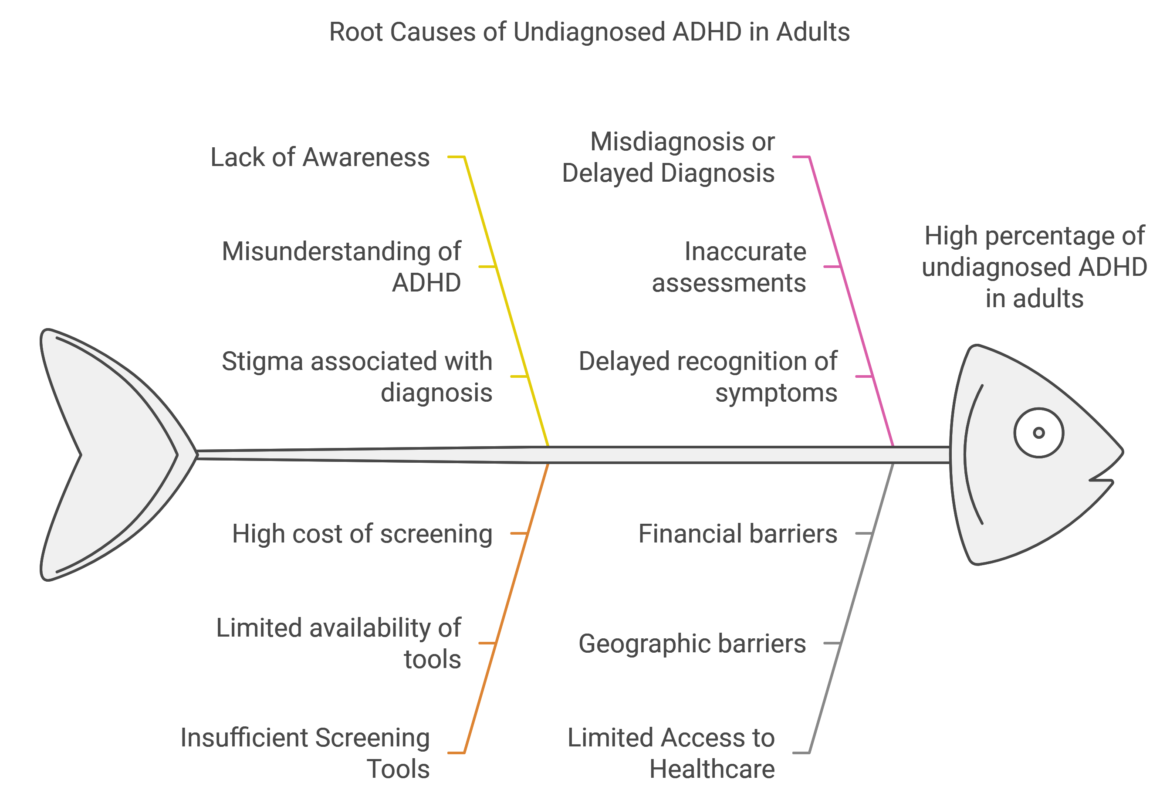
Understanding ADHD in Adults
ADHD is a neurodevelopmental disorder that can persist into adulthood, affecting approximately 4.4% of adults in the U.S. Despite this prevalence, only about 10% of adults with ADHD receive a formal diagnosis. The symptoms of ADHD can manifest in various ways, including difficulty focusing, impulsivity, and challenges in organizing tasks. These symptoms can significantly impact work performance, relationships, and overall quality of life. ADHD is a common developmental disorder among children, Attention-deficit/hyperactivity disorder, is one that involves both attention deficit and hyperactivity. Inattentiveness, impulsiveness, and hyperactivity are the most common symptoms of this disorder. There is also the possibility that it may disrupt a person’s mood, as well as make their daily lives much more challenging as a result.
CBD Oil for ADHD: Natural Relief or Hype?
With a growing interest in alternative treatments, many individuals are seeking information on the efficacy of CBD oil compared to other natural remedies. This research material provides a comparative analysis of various oils, relevant statistics, and insights into the current understanding of CBD oil’s impact on ADHD symptoms.
CBD and ADHD: Separating Fact from Fiction
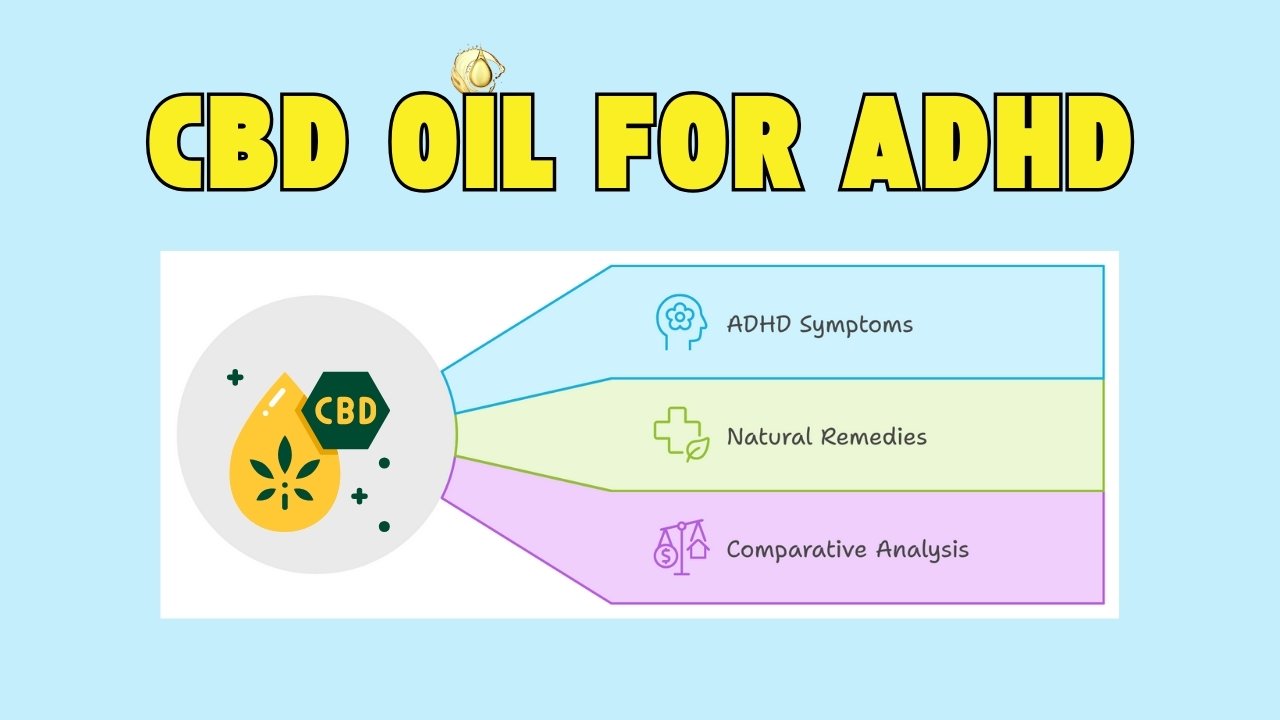
Best CBD Oils for ADHD: A Comparative Analysis
1. CBD Oil
- Source: Cannabis plant (hemp)
- Active Compounds: Cannabidiol (CBD)
- Potential Benefits: May reduce anxiety, improve focus, and promote relaxation.
- Statistics: A study published in the Journal of Attention Disorders found that 30% of participants reported significant improvement in ADHD symptoms after using CBD oil
2. Fish Oil
- Source: Fatty fish (e.g., salmon, mackerel)
- Active Compounds: Omega-3 fatty acids (EPA and DHA)
- Potential Benefits: Supports brain health, may improve attention and cognitive function.
- Statistics: Research indicates that children with ADHD who took fish oil supplements showed a 50% reduction in symptoms compared to a placebo group.
3. Evening Primrose Oil
- Source: Evening primrose plant
- Active Compounds: Gamma-linolenic acid (GLA)
- Potential Benefits: May help with mood regulation and reduce hyperactivity.
- Statistics: A small study found that children taking evening primrose oil experienced a 30% reduction in ADHD symptoms.
4. Lavender Oil
- Source: Lavender plant
- Active Compounds: Linalool and linalyl acetate
- Potential Benefits: Known for its calming effects, may help reduce anxiety and improve sleep.
- Statistics: A study showed that children exposed to lavender oil exhibited decreased anxiety levels, which can indirectly benefit ADHD symptoms.
Current Research and Findings For Use of CBD Oils
While anecdotal evidence and preliminary studies suggest that CBD oil may provide relief for some individuals with ADHD, comprehensive clinical trials are still limited. The variability in individual responses to CBD oil and other natural remedies highlights the need for further research.
The CBD-ADHD Connection: Evidence and Expectations
- Dosage: The appropriate dosage of CBD oil for ADHD is not well established and may vary from person to person.
- Quality of Product: The purity and concentration of CBD oil can significantly affect its efficacy. It is essential to choose high-quality products from reputable sources.
- Consultation with Healthcare Providers: Individuals considering CBD oil or other natural remedies should consult with healthcare professionals to ensure safe and appropriate use.
- CBD is not strictly regulated. CBD products aren’t scrutinized the same way prescription drugs are by the FDA. We’re still in the Wild West. A company might sell a bad product – or even a good product with false claims. CBD research is still happening. There is a good chance that we will learn more about CBD’s effects on ADHD in the very near future. If you are considering adding CBD to your daily routine, do your research and talk with your doctor first. CBD products vary — a lot. There are pros and cons to this! The best CBD product will depend on your tastes, budget, and goals, and it may take some time and money. CBD oil – and any CBD product – is only for you and your doctor to decide whether or not to take it.

What is CBD oil?
Cannabidiol, or CBD, is a compound found in high concentration in CBD oil. Among the 100 active compounds in cannabis, CBD is one of the most important. Tetrahydrocannabinol (THC) is the other active compound associated with cannabis. As a result of smoking or ingesting THC, a person feels euphoric or high. THC and CBD activate different brain regions, so CBD does not produce a high. Because of how CBD oil interacts with the body and brain, it may have several potential health benefits. A central nervous system receptor is part of the human body’s endocannabinoid system. As a result of its interaction with these receptors, CBD may have positive effects on the body.
CBD for ADHD: What People Actually Need to Know
ADHD can be treated with CBD, but there is little scientific evidence to support this claim. Cannabis, which contains over 100 compounds other than CBD, has been the subject of much research surrounding ADHD and CBD. Many people, however, report that CBD oil helps them cope with symptoms of ADHD, such as hyperactivity or restlessness, anecdotally. The substance is often used to treat ADHD in many people. Cannabis was used as a self-medication for adults with ADHD in a small study conducted in 2017. Brain function and symptoms were not significantly improved. The drug improved measures of impulsivity and hyperactivity slightly, but not enough to consider it more effective than a placebo.
CBD Oil For ADHD; Natural Relief or Hype?
CBD acts on opioid and glycine receptors in the brain, rather than cannabinoid receptors. They regulate pain and serotonin, a neurotransmitter that helps us feel good. As a result, CBD has demonstrated a number of health benefits. A few of these are:
● Inflammation reduction
● Immune system regulation
● Pain reduction
● Acting as an antipsychotic
● Seizure reduction
● Anxiety reduction
The benefits of CBD products are sometimes claimed to be numerous. While some of these benefits have been proven scientifically, others are simply anecdotal or overstated.
But is CBD safe to take for ADHD?
CBD oil presents a promising avenue for individuals seeking natural relief from ADHD symptoms, but it is essential to approach it with caution. While some studies indicate potential benefits, more rigorous research is needed to establish its effectiveness and safety. As with any treatment, personal experiences may vary, and it is crucial to consider all options and consult with healthcare providers before making decisions regarding ADHD management. It is well known that CBD can cause minor side effects, whether it is used to relieve anxiety, calm ADHD, or increase libido. The following reactions are possible: diarrhea sleepiness(Possibly due to the presence of THC in full-spectrum CBD). Even a low-risk ADHD treatment like CBD should be discussed with your doctor before trying it.
It is also recommended that the following populations stay away from the area: Anyone taking prescription meds. Certain medications don’t mix well with CBD. Consult your doctor before adding CBD to your routine if you take medications for ADHD or any other condition. Pregnant or nursing people. CBD and other cannabis-based products should be avoided if this is the case for you. Kids. Researchers found a link between cannabis use in childhood and adolescence and cognitive problems in older research from 2014. The exact cause of this is hard to pinpoint, since cannabis compounds (THC, CBD, CBN, etc.) can differ greatly. You should consult your child’s doctor before giving them CBD if they have ADHD.
Should you take CBD oil for ADHD?
Stress, sleep problems, anxiety, and general scatter brainedness could all benefit from CBD. However, it’s not approved as a treatment for ADHD. Consider these points: CBD is not strictly regulated. CBD products aren’t scrutinized the same way prescription drugs are by the FDA. We’re still in the Wild West. A company might sell a bad product – or even a good product with false claims. CBD research is still happening. There is a good chance that we will learn more about CBD’s effects on ADHD in the very near future. If you are considering adding CBD to your daily routine, do your research and talk with your doctor first. CBD products vary — a lot. There are pros and cons to this! The best CBD product will depend on your tastes, budget, and goals, and it may take some time and money. CBD oil – and any CBD product – is only for you and your doctor to decide whether or not to take it.
What CBD is best for ADHD?
Would you like to try CBD? There are no specific types or doses recommended for ADHD due to the lack of research. CBD can be used in a number of ways.
The focus will be on oils and tinctures, pills and capsules, and gummies and edibles. Each category will be evaluated based on factors such as bioavailability, ease of use, dosage control, and onset time, helping consumers make informed decisions.
Best CBD Oils for ADHD: A Comparative Analysis
Would you like to try CBD? There are no specific types or doses recommended for ADHD due to the lack of research. CBD can be used in a number of ways. Oils and tinctures. These liquid CBD products are arguably the most popular CBD products because they provide quick, full-body effect. You should start with the lowest amount possible since they aren’t pre-dosed.
Oils and tinctures.
These liquid CBD products are arguably the most popular CBD products because they provide quick, full-body effect. You should start with the lowest amount possible since they aren’t pre-dosed.
Overview
CBD oils and tinctures are liquid extracts that are typically taken sublingually (under the tongue), allowing for quick absorption into the bloodstream.
Pros
- High Bioavailability: Oils and tinctures generally have a higher bioavailability compared to other forms, meaning more of the active ingredient is absorbed into the body.
- Fast Onset: Effects can be felt within 15-30 minutes.
- Dosage Flexibility: Users can easily adjust their dosage by changing the number of drops taken.
Cons
- Taste: Some users may find the taste of CBD oil unpleasant.
- Measurement: Requires careful measurement to ensure proper dosing.
Recommended Products
- Charlotte’s Web CBD Oil: Known for its high-quality extraction and consistent dosing.
- Lazarus Naturals High Potency CBD Tincture: Offers a strong dose and is well-regarded for its affordability.
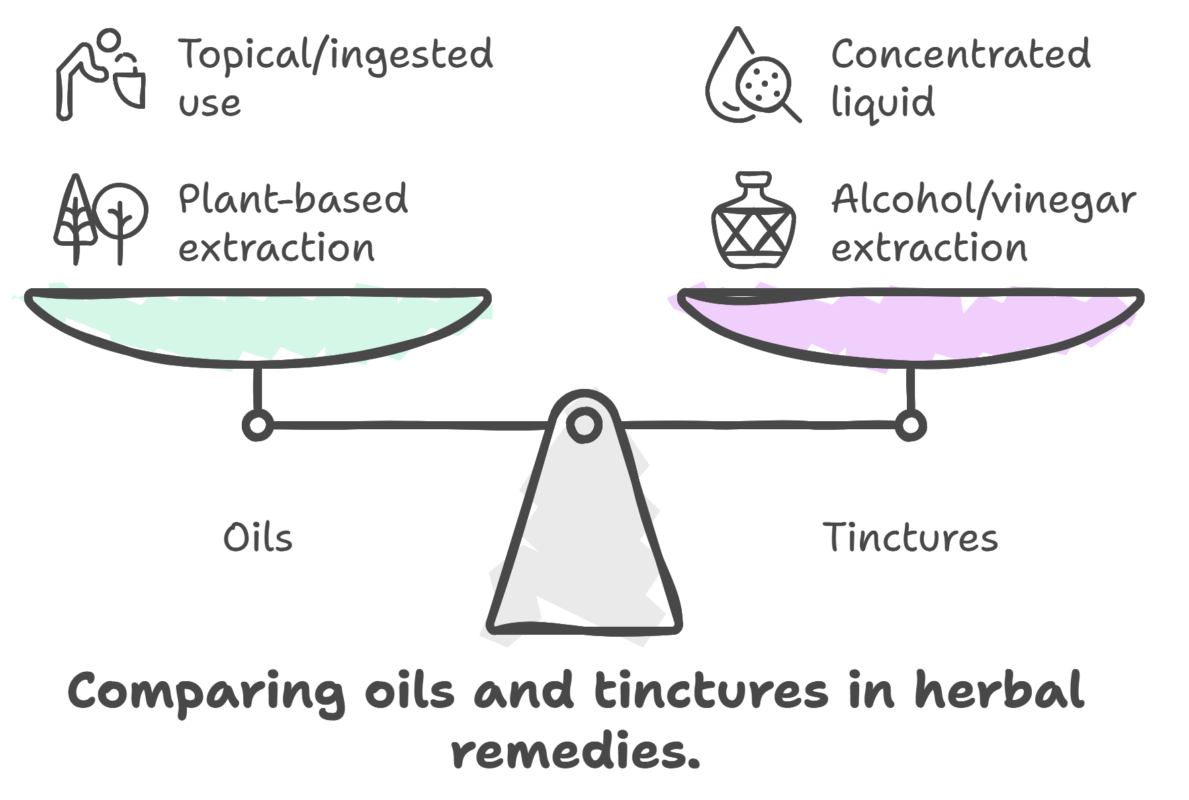
Pills and capsules.
It’s convenient and portable to take CBD supplements. Furthermore, the flavor of cannabis is less likely to be unpleasant. Gummies and edibles. It’s just like a softgel, but way better. Starting at the lowest dose is always the best way to ensure you are getting the most benefit from CBD. CBD pills and capsules are pre-measured doses of CBD that are easy to take and convenient for on-the-go use.
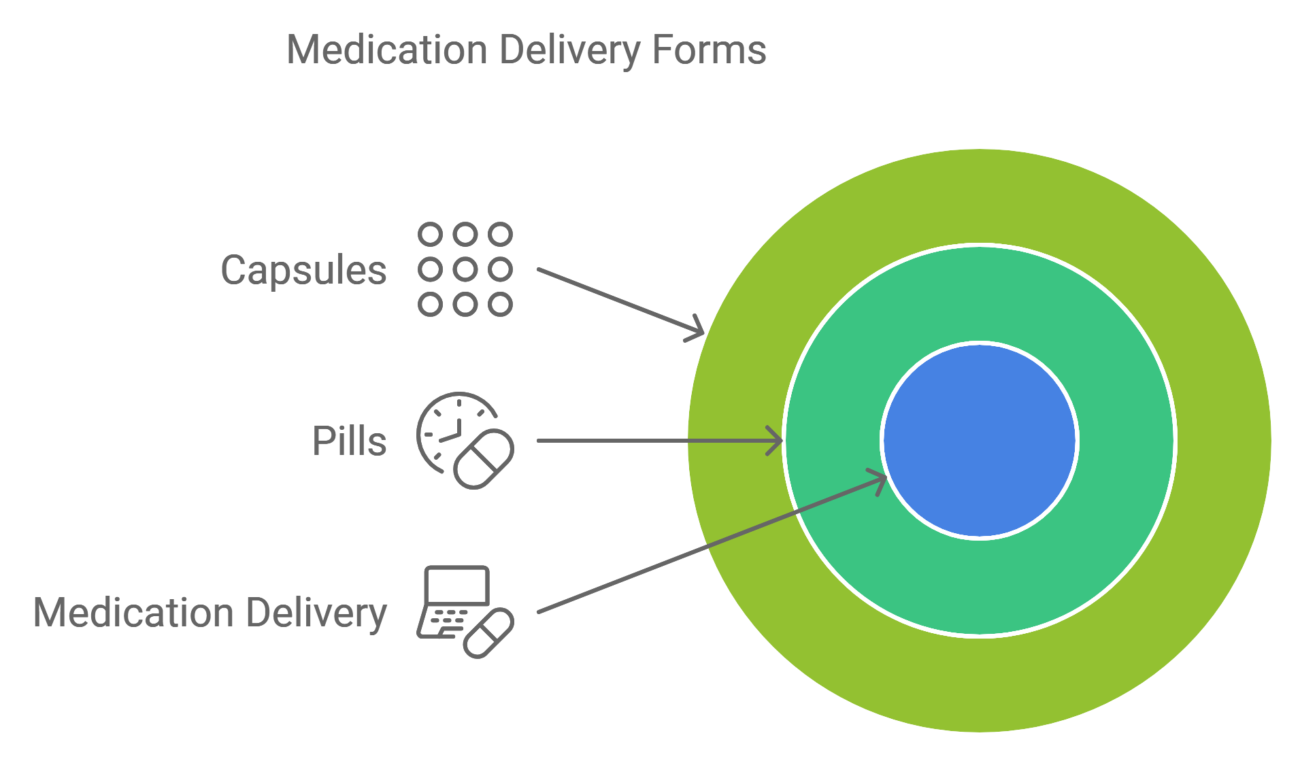
CBD pills or capsules For ADHD; Natural Relief OR Hype?
Overview
CBD pills and capsules are pre-measured doses of CBD that are easy to take and convenient for on-the-go use.
Pros
- Convenience: Easy to carry and consume without any preparation.
- Discreet: No strong odor or taste, making them suitable for public use.
- Consistent Dosing: Each capsule contains a fixed amount of CBD, simplifying dosage.
Cons
- Lower Bioavailability: Pills and capsules may have lower bioavailability due to the digestive process.
- Delayed Onset: Effects may take longer to manifest, typically 30-90 minutes.
Recommended Products
- CBDistillery CBD Capsules: Offers a reliable dose and is made from high-quality hemp.
- Medterra CBD Gel Capsules: Known for their purity and effectiveness.
CBD Gummies and Edibles are Natural Relief or Hype For ADHD Symptoms
Overview
Gummies and edibles. It’s just like a softgel, but way better. Starting at the lowest dose is always the best way to ensure you are getting the most benefit from CBD.
CBD gummies and edibles are flavored products that combine CBD with other ingredients, making them a tasty option for consumption.
Overview
CBD gummies and edibles are flavored products that combine CBD with other ingredients, making them a tasty option for consumption.
Pros
- Taste: Gummies and edibles are often more palatable than oils or capsules.
- Disguised Consumption: They look like regular candy, making them discreet and appealing.
- Longer Lasting Effects: The effects may last longer due to the slow digestion process.
Cons
- Variable Dosing: It can be challenging to determine the exact amount of CBD in each gummy or edible.
- Slower Onset: Effects may take 1-2 hours to kick in.
Recommended Products
- Charlotte’s Web CBD Gummies: Popular for their great taste and effectiveness.
- Green Roads CBD Gummies: Known for their quality and variety of flavors.
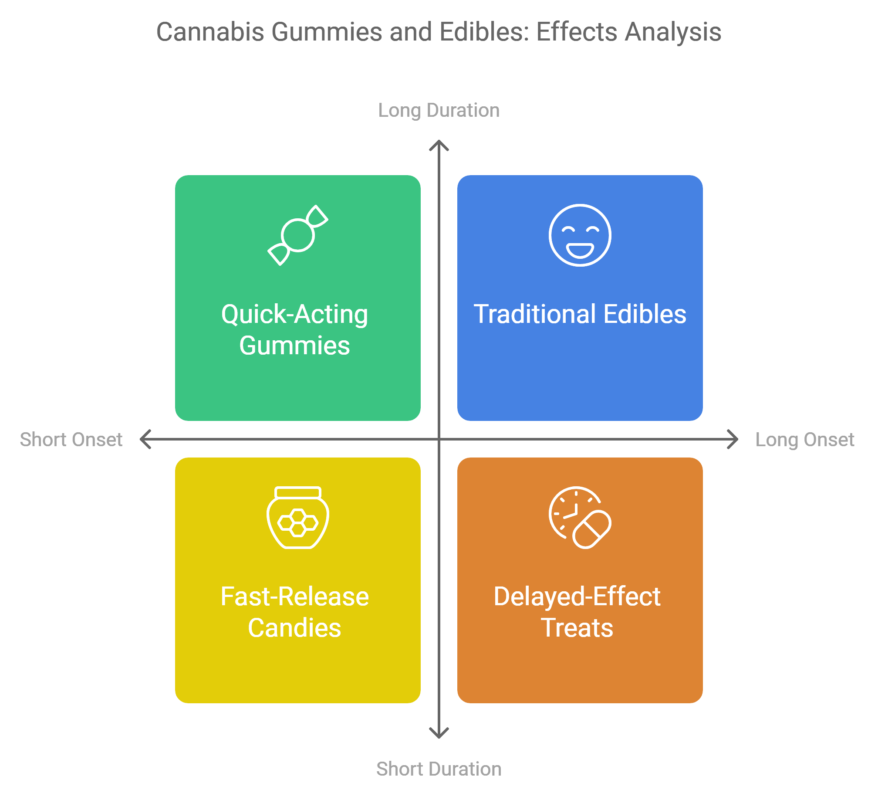
Conclusion: ADHD Treatment; Is CBD a Viable Option
When considering CBD for ADHD, the choice between oils and tinctures, pills and capsules, or gummies and edibles largely depends on personal preferences regarding taste, convenience, and desired onset time. Oils and tinctures offer rapid effects and dosage flexibility, while pills and capsules provide convenience and consistent dosing. Gummies and edibles are ideal for those who prefer a tasty option but may require more careful consideration regarding dosing. Always consult with a healthcare professional before starting any new supplement regimen, especially for managing ADHD symptoms.
CBD is still undergoing very limited research in the treatment of ADHD. Several studies are needed to determine whether cannabis compounds can curtail hyperactivity, impulsivity, or inability to focus. Scientists believe CBD can help ease stress, anxiety, and disrupted sleep. CBD may help if you experience any of those symptoms when you have ADHD. It may be useful to include CBD in your focus and productivity toolkit since it seems to be low risk for most people. Talk to your doctor before taking CBD if you take prescription medications or plan to become pregnant.
Current Research on CBD and ADHD
- Mechanism of Action: CBD interacts with the endocannabinoid system, which plays a role in regulating mood, attention, and behavior. Studies suggest that CBD may help modulate neurotransmitter release, potentially alleviating some ADHD symptoms.
- Clinical Studies: A limited number of clinical studies have investigated the effects of CBD on ADHD. For instance, a 2020 study published in the Journal of Psychopharmacology found that CBD may reduce hyperactivity and improve attention in children with ADHD. However, the sample size was small, and further research is needed.
- Anecdotal Evidence: Many parents and individuals with ADHD report positive experiences with CBD, citing improvements in focus and reductions in impulsivity. Online forums and testimonials highlight CBD’s potential as a complementary treatment, although these accounts lack rigorous scientific validation.
- Safety and Side Effects: While CBD is generally considered safe, potential side effects include fatigue, changes in appetite, and gastrointestinal discomfort. It is essential for individuals to consult healthcare professionals before starting any new treatment.
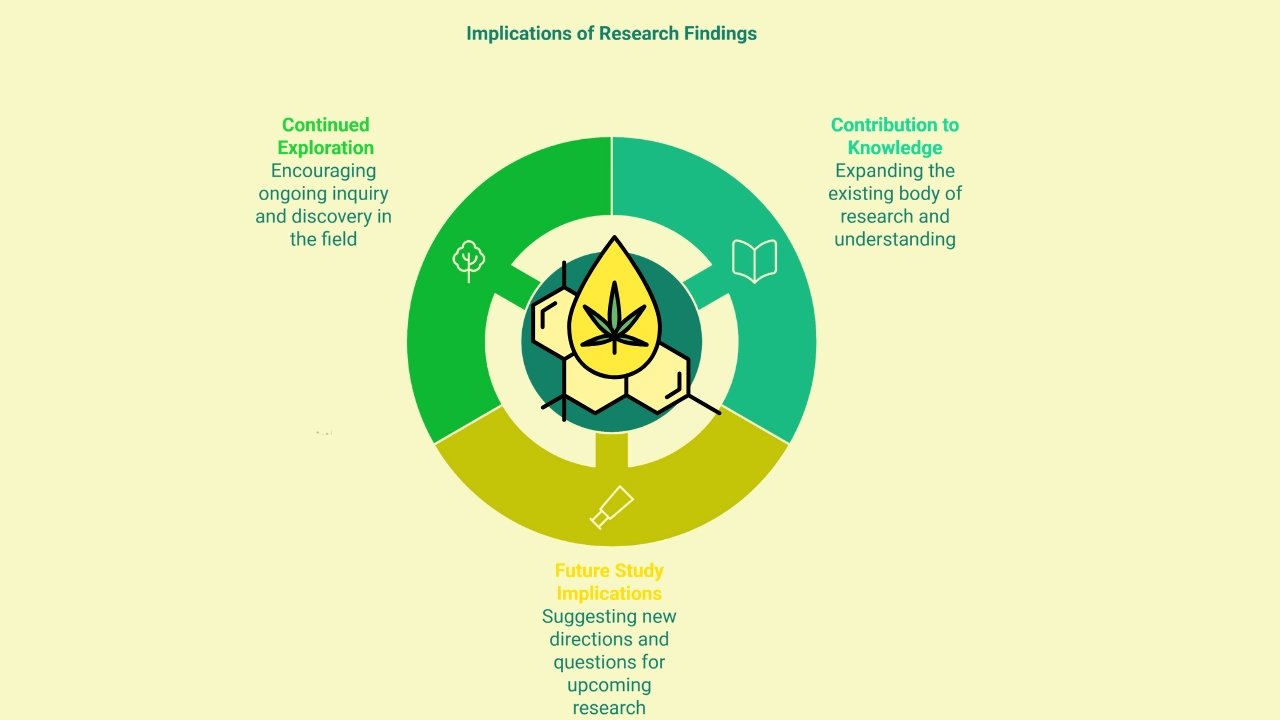
CBD Oils: A Natural Relief or Hype?
A comprehensive glossary exploring the science, benefits, and limitations
Basic Terminology
CBD (Cannabidiol)
A non-psychoactive compound extracted from cannabis plants. Unlike THC, CBD doesn’t produce a “high” sensation.
Full-Spectrum CBD
Contains all naturally occurring compounds from the cannabis plant, including trace amounts of THC (≤0.3%).
Broad-Spectrum CBD
Similar to full-spectrum but with THC completely removed while retaining other beneficial compounds.
CBD Isolate
Pure CBD with all other compounds removed, typically 99%+ pure cannabidiol.
Potential Benefits & Evidence Scale
Anxiety Relief
May help reduce anxiety and stress responses.
Moderate EvidencePain Management
Could help with chronic pain and inflammation.
Moderate EvidenceEpilepsy
FDA-approved for certain forms of epilepsy (Epidiolex).
Strong EvidenceSleep Enhancement
May improve sleep quality and duration.
Limited EvidenceCommon Misconceptions
“All CBD is the Same”
Quality, purity, and effectiveness can vary significantly between products and manufacturers.
“CBD Cures Everything”
While promising, CBD is not a miracle cure. More research is needed for many claimed benefits.
“CBD is Completely Risk-Free”
While generally well-tolerated, CBD can interact with medications and cause side effects in some people.
How to Choose Quality CBD
Third-Party Testing
Look for products with certificates of analysis from independent laboratories.
Extraction Method
CO2 extraction is considered the gold standard for purity and safety.
Source of Hemp
Choose products made from organically grown hemp in regulated environments.
CBD Oil for ADHD: Natural Relief or Hype?
Frequently Asked Questions About Using CBD Oil for ADHD Management
- Fatigue or drowsiness
- Changes in appetite
- Dry mouth
- Digestive issues
- Potential interactions with other medications
- Third-party tested
- Clear about CBD content
- Free from contaminants
- Purchased from reputable manufacturers
- Consult with a healthcare provider first
- Start with a low dose and gradually increase if needed
- Keep track of any effects or changes in symptoms
- Choose high-quality products from reputable sources
- Don’t stop prescribed medications without medical supervision
Common ADHD Screening Tools for Adults
These professionally developed assessment tools help identify and evaluate ADHD symptoms in adults. Each tool has its own specific focus and methodology.
1. ASRS (Adult ADHD Self-Report Scale)
A widely used 18-question screening tool developed by the World Health Organization. It helps identify symptoms that are consistent with ADHD in adults.
2. DIVA 2.0 (Diagnostic Interview for ADHD in Adults)
A structured diagnostic interview that assesses both current and childhood symptoms of ADHD.
3. Barkley Adult ADHD Rating Scale-IV (BAARS-IV)
This scale assesses current ADHD symptoms and domains of impairment in adults.
4. Conners’ Adult ADHD Rating Scales (CAARS)
These scales measure the presence and severity of ADHD symptoms in adults.
5. Brown Attention-Deficit Disorder Scales for Adults
This tool focuses on executive function impairments associated with ADHD.
References and Resources
Resources and References for Adult ADHD
Organizations and Support Groups
- CHADD (Children and Adults with Attention-Deficit/Hyperactivity Disorder) – Provides education, advocacy, and support for individuals with ADHD
- ADDA (Attention Deficit Disorder Association) – Focused on helping adults with ADHD lead better lives
- ADDitude Magazine – Online resource for ADHD information, strategies, and support
Educational Resources
Books on Adult ADHD
- “Driven to Distraction” by Edward M. Hallowell and John J. Ratey
- “Taking Charge of Adult ADHD” by Russell A. Barkley
- “The ADHD Effect on Marriage” by Melissa Orlov
- “The Smart but Scattered Guide to Success” by Peg Dawson and Richard Guare
Scientific References
- Kessler, R. C., et al. (2006). The prevalence and correlates of adult ADHD in the United States: Results from the National Comorbidity Survey Replication. American Journal of Psychiatry, 163(4), 716-723.
- Faraone, S. V., et al. (2015). Attention-deficit/hyperactivity disorder. Nature Reviews Disease Primers, 1, 15020.
- Sibley, M. H., et al. (2017). Late-onset ADHD reconsidered with comprehensive repeated assessments between ages 10 and 25. American Journal of Psychiatry, 174(4), 329-340.
Note: This list is not exhaustive and is meant to serve as a starting point for finding information about adult ADHD. Always consult with healthcare professionals for personalized advice and treatment options.
html Copy codeADHD Screening Calculator for Adults
The views and opinions expressed in this article are those of Rosemary Ingado, PA-C, a Physician Assistant practicing in Maryland. This article is for informational purposes only and does not constitute medical advice. The content about CBD oil and ADHD is not intended to be a substitute for professional medical advice, diagnosis, or treatment. Always seek the guidance of your healthcare provider before starting any new treatment, including CBD products. The author’s experiences and observations are based on professional practice but individual results may vary. CBD products are not FDA-approved for treating ADHD, and research in this area is still ongoing. Consult with your healthcare provider to determine if CBD products might be appropriate for your specific situation, especially considering potential drug interactions and side effects.
Marketing Usage Disclaimer
This article may be used by althings.online for marketing, research, or affiliate marketing purposes. No individual comments are shared or solicited for third-party marketing.
Sleep Aid Oil Calculator
Recommended Dosage Ranges:
CBD Oil: —
Cannabis Oil: —
Important Disclaimer: This calculator provides general guidance only. Actual dosing needs vary by individual. Always consult with a healthcare provider before starting any new supplement regimen. Start with the lowest effective dose and adjust gradually.
